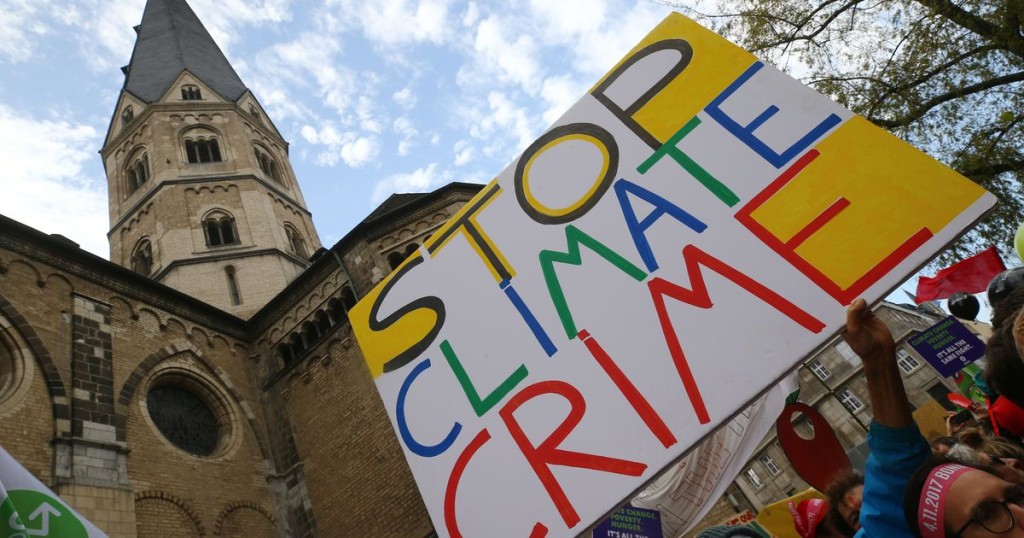Boston, 14 June 2018, (COI) – Several developing countries continued to champion the need to have a policy on “conflicts of interest” in the UNFCCC at the recent climate talks in Bonn, Germany, last month, but their calls were not reflected in the outcome of the discussions given strong opposition, especially from developed countries. Despite not being reflected in the final outcome of the discussions, attempts at burying this issue were thwarted by some developing countries led by Ecuador, who managed to ensure that this discussion would continue to be on the agenda at next year’s climate talks in 2019.
The “conflicts of interest” policy issue was raised under the agenda item on “arrangements for intergovernmental meetings (AIM)” under the UNFCCC’s Subsidiary Body for Implementation (SBI) and comprised 8 hours of negotiations at the recent climate talks held from 30 April to 10 May.
This agenda item centred on views from Parties on “non-Party stakeholder engagement” with a view to considering how such engagement can be further enhanced.
Following the SBI session held in May last year, Parties and non-Party stakeholders provided a range of submissions on this matter, the majority of which explicitly discussed the issue of conflicts of interest.
However, despite a large part of the eight hours of negotiations taken up on a discussion around conflicts of interest, there was no such mention of this issue in the conclusions adopted coming from the SBI session, given the opposition primarily from developed countries.
Interventions made to address this issue came overwhelmingly from developing countries, which included the African Group, Ecuador, Cuba, El Salvador, Venezuela and China.
Specifically, Uganda on behalf of the African Group highlighted the risks that could arise when non-Party stakeholders have interests in continuing to expand and promote greenhouse gas (GHG) emissions, which are not aligned with the pursuit of the Paris Agreement or in conformity with the fact that the UNFCCC is a party-driven process.
(In its submission to the UNFCCC on the matter, the African Group said that “in the absence of such a framework [on conflicts of interest], engagement by certain non-Party stakeholders with vested interests threatens the integrity and legitimacy of the UNFCCC process, and risks decreasing the chances of achieving the collective goal to limit global temperature rise to well below 2 or as close to 1.5 degrees Celsius as possible. With a clear framework for addressing the potential for conflicts of interest in place, all UNFCCC Parties can be assured that enhanced participation by non-Party stakeholders will advance the objectives of the UNFCCC and its Paris Agreement, and the integrity and legitimacy of the UNFCCC process will be maintained and enhanced.”)
Cuba and Ecuador echoed these sentiments, stating the need for a framework on non-Party stakeholder engagement that ensures this occurs in total alignment with the principles of the Convention.
Senegal also on behalf of the African Group, called for a policy on conflict of interest to ensure that no non-State actor not in conformity with the purpose of the Convention and its process can jeopardize Party’s work.
China reiterated that on the issue of conflicts of interest, it is not a question of whether it does or does not exist, but rather how to address it, citing specifically the clarity coming from civil society on the matter.
China was referring to interventions from the majority of civil society who gave interventions which comprised youth non-governmental organizations (YOUNGO), women and gender groups, the indigenous peoples’ organizations (IPO), and Climate Justice Now (CJN), all of whom strongly called for a definition of conflicts of interest and a framework to address it.
However, other than the business-interest NGOs (BINGO) constituency, Climate Action Network was the only civil society constituency in the room whose intervention did not mention the need to address conflicts of interest.
In contrast, the interventions made to adamantly oppose such measures or absolutely any mention of the term “conflicts of interest” came overwhelmingly from developed countries, namely the United States, Norway, New Zealand and Australia.
The divide between developed countries and developing countries on how to meaningfully address the climate crisis was distinctly palpable in the AIM negotiation rooms, more than it has ever been before.
In vehement opposition, Australia argued that it would be impossible to accept something internationally that it did not do domestically, adding that “business is a critical part of the (climate) solution.” (According to some experts on the issue, Australia does have a 2013 Public Governance, Performance and Accountability Act as well as the Australian Public Service Code of Conduct, both of which specifically discuss avoiding conflicts of interest [real or apparent] during public service.)
The European Union (EU) was not particularly vocal on the issue considering that the European Parliament had called for it to tackle vested interests at the UN climate talks, speaking to the power of communities that pressure national governments on climate action.
According to observers, the EU negotiators did not heed the resolution passed by the European Parliament to address conflicts of interest issue, nor did they support the developing countries in the room calling for exactly that.
Developing and developed countries, however, both called for open, inclusive and transparent intergovernmental processes, but seemed to disagree as to how such processes can be safeguarded to ensure openness, inclusivity and transparency.
Ecuador, Cuba and Venezuela, alongside public interest serving civil society constituencies, highlighted the fact that conflicts of interest policies are what drive these values. They also noted that such policies are a standard around the world, supported by overwhelming national and international precedents.
Cuba said that it was fully committed to a process that was broad, inclusive and open and with transparency. However, it stressed the need to have some kind of general principles to be adhered to in order to ensure the participation of non-party actors to be in full alignment with the principles of the Convention.
Australia sharply disagreed, devotedly citing business as the means for transitioning to a low-carbon economy. Both mentioned this topic in reference to good governance.
Developing countries, particularly Ecuador, clearly drew the connection between vested industry interests not necessarily being in line with the spirit and objectives of the UNFCCC and Paris Agreement stating that “business is important to the process, but at the same time, not just any business,” it said, adding that it should include only those that “are committed to the UNFCCC and climate action and the principles therein,”.
Developed countries, particularly Australia, New Zealand, and the United States did not agree, citing the need for the industry to be a part of the process.
Fiji’s Ambassador and Special Envoy to the UNFCCC, Deo Saran, chaired the session and noted the diverging views multiple times. Saran said that he had to navigate hours of “constructive dialogue” on this agenda item on the last day of the contact group’s meeting, urging for compromise even on seemingly uncontroversial issues like capturing the objectives of the Convention, a reference that the United States successfully negotiated out of the text.
Thus, what started as impassioned calls for decision makers to create a space for their decision making to be free of clearly conflicting commercial and vested interests that directly contradict the work that Parties have committed to do, ended with no reference to the very objective of the Convention that seeks to address climate change.
In the end, developing countries were simply calling for the conclusion text to at least reflect the “constructive conversation” had in the room over the past several days with a clear mandate for it to continue moving forward. Developed countries did not oblige.
In the final conclusion that was adopted, the SBI “reiterated the importance of enhancing the engagement of non-Party stakeholders in the intergovernmental process and took note of the diverse views expressed by Parties regarding their engagement.”
“In this regard, the SBI invited Parties and non-Party stakeholders to continue to identify at SBI 50 (in 2019) opportunities and improved practices to further enhance the openness, transparency, inclusiveness and balance of the effective engagement of non-Party stakeholders, in a manner that enhances the implementation of the Convention.”
Given the expected resistance of developed countries to any policy in the UNFCCC to address conflicts of interest, whether any headway will be made at the 2019 session on this matter remains to be seen.
(Corporate Accountability International).
Edited by Meena Raman




